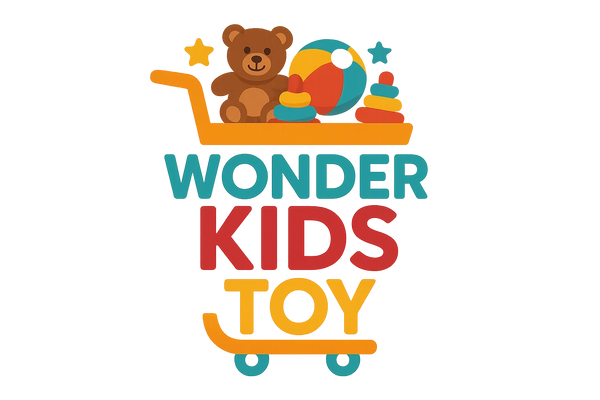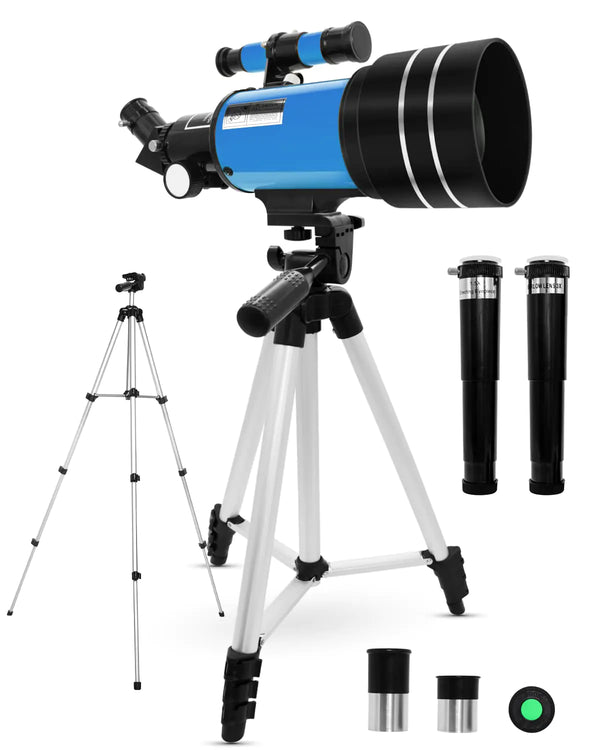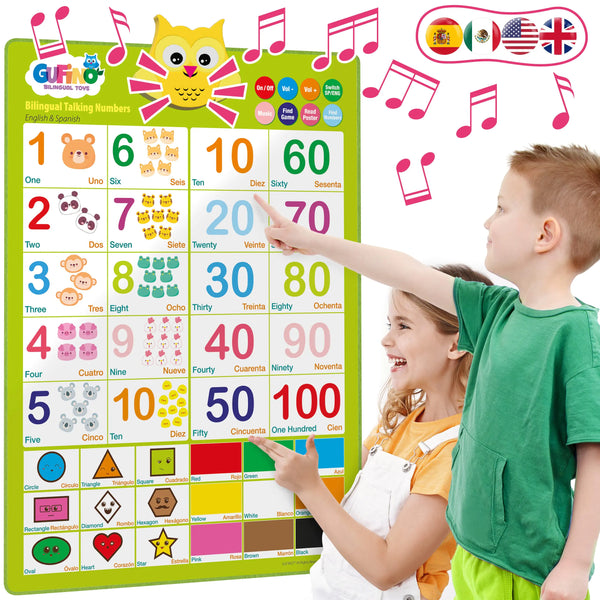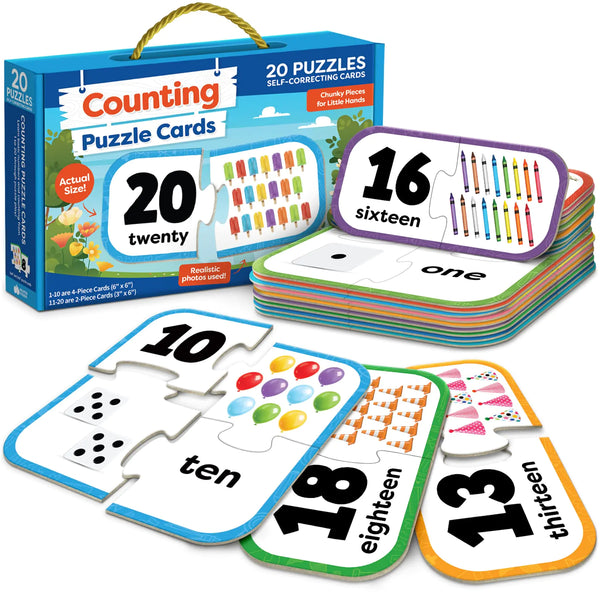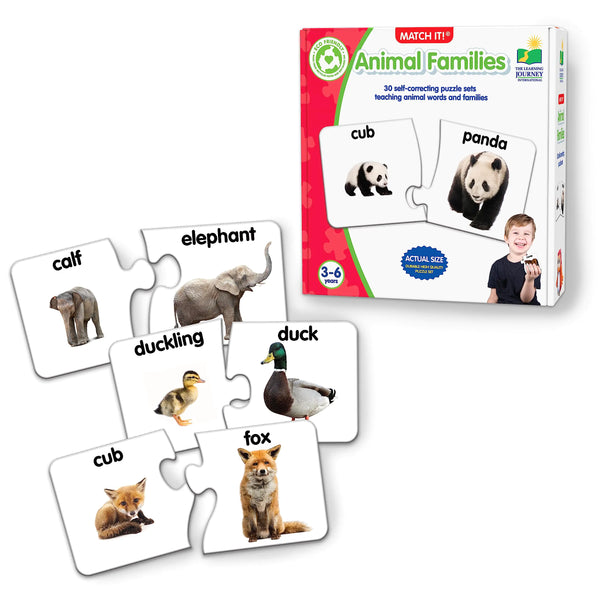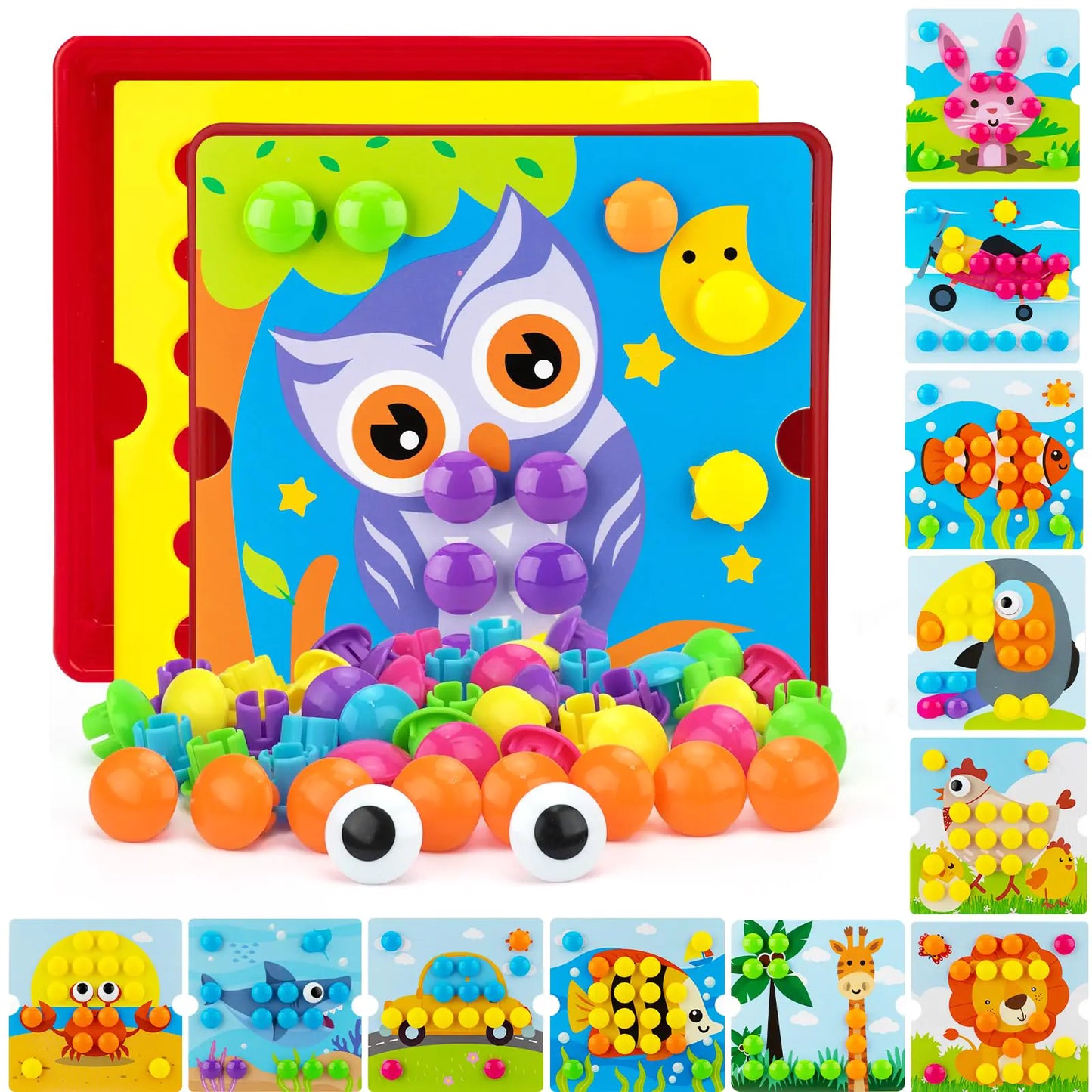In the vast and mysterious expanse of outer space, there is a universe of wonder, adventure, and endless possibilities waiting to be discovered. At KidPowered, we believe in inspiring young minds to reach for the stars and explore the cosmos. That's why we've curated a collection of Outer Space Toys that go beyond mere playthings—they're instruments of imagination, tools for education, and gateways to a universe of creative possibilities. From building rockets to stargazing with telescopes, our selection is designed to ignite curiosity and foster a love for space exploration in children.
Key Takeaways
- Space-themed educational toys can ignite a child's curiosity about the universe.
- Rocket building kits offer hands-on learning experiences and foster problem-solving skills.
- Telescopes designed for kids can make stargazing an accessible and exciting activity.
- Interactive solar system models provide a tangible way for kids to learn about planets and space.
- Space-themed puzzles and games can enhance learning through play and improve cognitive skills.
Blast Off with Rocket Building Kits

Why Rocket Kits Are Awesome
Rocket building kits are a fantastic way to combine fun and education. They offer hands-on experience with basic principles of physics and engineering. Kids get to learn while having a blast! Plus, the sense of accomplishment they feel when their rocket soars into the sky is simply priceless.
Top Rocket Kits for Kids
Here are some of the best rocket kits that your kids will love:
- Stomp Rocket Stunt Planes: These are easy to use and provide endless fun. Just run, jump, and stomp to launch the rockets.
- NASA Space Shuttle Construction Kit: A bit more challenging, this kit is perfect for older kids who love a good project.
- Jackinthebox Space Explorer DIY Box: This kit includes a rocket experiment among other fun activities, making it a great all-in-one option.
Safety Tips for Rocket Building
Safety is paramount when it comes to rocket building. Here are some tips to keep in mind:
- Always supervise your kids during the building and launching process.
- Make sure to launch rockets in an open area, away from trees and buildings.
- Use protective eyewear to shield eyes from any debris.
Building rockets is not just about fun; it's about learning and growing together. With the right kit and safety measures, your kids can have an educational and thrilling experience.
Stargazing with Kid-Friendly Telescopes

Choosing the Right Telescope
When it comes to choosing a telescope for your kids, there are a few key factors to consider. First, think about the age and interest level of your child. For younger kids, a simple refractor telescope might be the best option. These are easy to use and can provide clear views of the moon and larger planets. For older kids who are more serious about astronomy, a more advanced reflector telescope might be a better fit. Make sure to choose a telescope that is sturdy and easy to set up so that your child can use it independently.
Top Telescope Picks
Here are some of the best telescopes for kids that I've come across:
- Celestron 21035 70mm Travel Scope - This is a great starter telescope that is portable and easy to use.
- Orion StarBlast 4.5 Astro Reflector Telescope - Perfect for older kids who want to see more detail in the night sky.
- Emath Refractor Telescope - A solid choice for beginners, with clear instructions on what lenses to use for different celestial bodies.
Tips for Stargazing with Kids
Stargazing can be a magical experience for kids, but it's important to make it fun and engaging. Here are some tips to get the most out of your stargazing sessions:
- Plan Ahead: Check the weather and moon phases to pick the best night for stargazing.
- Dress Warmly: Nights can get chilly, so make sure everyone is dressed appropriately.
- Use a Star Map: A star map or an app can help you identify constellations and planets.
- Make it a Game: Turn stargazing into a fun game by challenging your kids to find specific stars or constellations.
Stargazing is not just about looking at stars; it's about sparking curiosity and a love for science in your kids. With the right telescope and a little bit of planning, you can create unforgettable memories and maybe even inspire a future astronomer!
Interactive Solar System Models

Benefits of Solar System Models
Interactive solar system models are a fantastic way to bring the wonders of space right into your living room. Kids can visually grasp complex concepts like planetary orbits and the scale of the solar system. These models often come with glow-in-the-dark features, making them not only educational but also a fun night-time activity. Plus, they encourage hands-on learning, which is great for developing fine motor skills and spatial awareness.
Best Solar System Kits
Here are some top picks for solar system kits that your kids will love:
- KIDZ LABS Solar System Planetarium: This build-your-own model is perfect for kids who love both space and DIY projects. It’s 30cm wide and glows in the dark, making it a hit for night-time stargazing.
- National Geographic Glow-in-the-Dark Earth and Stars Kit: This kit includes everything needed to recreate the Earth and a starry sky. Kids can paint and assemble the models, learning about geography and astronomy in the process.
- Thames & Kosmos Solar System Model: Build a scale model of our solar system with this interactive kit. It comes with a light-up sun and detailed planet models, making learning about planetary orbits and sizes hands-on and fun.
- BuildingBoat Rotatable Earth, Moon, and Sun Solar System Building Kit: This kit allows kids to understand the relationship between the Earth, Moon, and Sun through a rotatable model.
Fun Activities with Solar Models
Using solar system models can be more than just a build-and-display activity. Here are some fun ways to engage with these models:
- Planetary Orbits Game: Create a game where kids have to place the planets in the correct order from the sun. This helps reinforce their knowledge of the solar system.
- Glow-in-the-Dark Stargazing: Turn off the lights and let the glow-in-the-dark features of the models shine. This can be a fun way to end the day and spark conversations about space.
- Space Trivia: Use the models as a visual aid while quizzing your kids on space facts. This makes learning interactive and fun.
Interactive solar system models are not just toys; they are gateways to a universe of knowledge and imagination. They make learning about space an adventure that kids will cherish.
Space-Themed Puzzles and Games

Puzzles are a fantastic way to engage kids in learning while having fun. They help develop critical thinking, problem-solving skills, and hand-eye coordination. Space-themed puzzles add an extra layer of excitement by sparking curiosity about the universe. When kids piece together images of planets, rockets, and astronauts, they are not just playing—they're also learning about space in a hands-on way.
Here are some of the best space-themed puzzles that your kids will love:
- Melissa & Doug Solar System Floor Puzzle: This 48-piece puzzle is perfect for younger kids and offers a colorful, detailed view of our solar system.
- Mudpuppy Glow-in-the-Dark Puzzle: Featuring 100 pieces, this puzzle glows in the dark, making it extra fun to complete.
- Ravensburger Space Puzzle: Known for their high-quality puzzles, Ravensburger offers a 200-piece space puzzle that's both challenging and educational.
Interactive games take learning to the next level by combining education with play. Here are some top picks:
- Space Exploration Playset: This set includes miniature spacecraft, astronauts, and alien creatures, allowing kids to create their own adventures among the stars.
- ThinkFun Gravity Maze: While not exclusively space-themed, this game involves guiding a marble through a maze, teaching kids about gravity and physics in a fun way.
- Educational Insights GeoSafari Jr. Talking Telescope: This interactive toy lets kids learn about space through fun facts and quizzes, making stargazing even more exciting.
Puzzles and games are not just about keeping kids busy; they are powerful tools for learning and development. By choosing space-themed options, you're opening up a universe of knowledge and fun for your little ones.
Astronaut Dress-Up and Role Play

Benefits of Role Play
Role play is an incredible way for kids to learn and grow. When children dress up as astronauts, they don't just look the part—they start to think and act like real space explorers. This imaginative play helps develop problem-solving skills, creativity, and empathy. Plus, it's a fantastic way to make learning about space fun and engaging.
Top Astronaut Costumes
Finding the perfect astronaut costume can be a game-changer for your child's playtime. Here are some top picks:
- Aeromax Jr. Astronaut Suit: This suit is realistic and comes with NASA patches, making your child feel like a true astronaut.
- Melissa & Doug Astronaut Role Play Costume Set: Known for its quality, this set includes a jumpsuit, gloves, and a shiny helmet.
- Daron NASA Space Adventure Series: This set includes a space capsule with lights and a figurine, perfect for interactive play.
Creating a Space Mission at Home
Creating a space mission at home is easier than you think. Start by setting up a 'mission control' area with some simple props like a cardboard box for a control panel and some printed space maps. Encourage your child to come up with a mission objective, like exploring a new planet or fixing a satellite. You can even incorporate some educational elements, like learning about the planets or the phases of the moon. The key is to make it as interactive and educational as possible.
Role-playing as an astronaut can turn an ordinary day into an extraordinary adventure, sparking a lifelong interest in space and science.
Educational Space Books for Kids

One of the best ways to introduce kids to the wonders of space is through books. "Little Kids First Big Book of Space" by Catherine D. Hughes is a fantastic choice. It features simple texts for beginners and colorful illustrations that make understanding space concepts easy and fun.
Reading about space can ignite a child's imagination and curiosity. It helps them learn about the Solar System, the history of spaceflight, and the vastness of the cosmos. Books can be a great supplement to hands-on activities like building a rocket or solving a space-themed puzzle.
Interactive books can make learning about space even more engaging. Look for books with pop-ups, flaps, and other interactive elements that can make the learning experience more immersive. These books not only educate but also entertain, making them a great addition to any child's library.
Reading space books can be a gateway to a lifelong interest in astronomy and science. They provide a solid foundation of knowledge that can inspire future learning and exploration.
Space-Themed LEGO Sets

LEGO sets are not just toys; they are powerful educational tools. They help kids develop fine motor skills, spatial awareness, and problem-solving abilities. When kids build with LEGO, they learn to follow instructions, think critically, and use their imagination. Exploring the cosmos with LEGO sets can spark a lifelong interest in science and engineering.
Here are some of the best space-themed LEGO sets that will captivate your child's imagination:
- LEGO International Space Station: This 864-piece set includes posable solar panels, a mini space shuttle, three cargo spacecraft, and two astronaut microfigures. It's perfect for kids who dream of working with NASA.
- LEGO Apollo 11 Moon Lander: This set allows kids to recreate the historic moon landing. It includes a detailed lunar module and astronaut figures.
- Mars Research Shuttle: Inspired by NASA, this set lets kids pretend to orbit Mars and use a rover to retrieve geodes. It's a fantastic way to combine space love with imagination.
Building LEGO sets can be a fun and educational experience for both kids and parents. Here are some tips to make the most out of your LEGO building sessions:
- Sort the pieces before you start building. This makes it easier to find the pieces you need and keeps the workspace organized.
- Follow the instructions step-by-step. Encourage your child to read and understand each step before moving on to the next.
- Use a flat, well-lit surface for building. This helps prevent pieces from getting lost and makes it easier to see what you're doing.
- Take breaks if needed. Building a complex set can be time-consuming, so it's okay to take breaks and come back to it later.
Building LEGO sets together is a great way to bond with your child while fostering their creativity and problem-solving skills. Plus, it's a lot of fun!
With these tips and some amazing space-themed LEGO sets, your child will be well on their way to becoming a little astronaut, ready to explore the cosmos!
DIY Space Crafts and Activities

One of the best ways to get kids excited about space is through hands-on crafts. From building rockets to creating cosmic kaleidoscopes, these activities are not only fun but also educational. For instance, the Jackinthebox Space Explorer DIY Box offers six different craft activities, including a rocket experiment and a Solar System wind chime. These activities encourage kids to use their imagination, learn practical skills, and build confidence.
Crafting isn't just about having fun; it's also a fantastic way to learn. When kids engage in space-themed crafts, they develop fine motor skills, improve hand-eye coordination, and enhance their creativity. Moreover, these activities often involve problem-solving and critical thinking, which are essential skills for any budding scientist or engineer.
If you're looking for a comprehensive kit, the NASA Space Shuttle Construction Kit and the 3D Glow-in-the-Dark Solar System Mobile Making Kit are excellent choices. These kits come with all the materials needed to complete the projects, making it easy for parents and kids to dive right in. Plus, they provide a great opportunity for family bonding as you work together to create something amazing.
Crafting space-themed projects is a wonderful way to combine fun and education, making learning about the cosmos an exciting adventure for kids.
Space-Themed Board Games

When it comes to space-themed board games, there are some fantastic options that can make learning about the cosmos a blast. Top Trumps Space Exploration Card Game is a classic that tests your knowledge of cosmic facts, from the Apollo missions to celestial objects. Another great pick is the BrainBox Space Game, where kids can study a fact card for 10 seconds and then answer questions based on the roll of a die. These games are not only fun but also educational, making them perfect for family game nights.
Board games offer numerous benefits for kids. They help develop critical thinking and problem-solving skills, enhance memory, and encourage social interaction. Space-themed board games, in particular, can spark an interest in astronomy and science. They provide a hands-on way to learn about the universe, making complex concepts more accessible and engaging for young minds.
Creating a family game night around space-themed board games can be a wonderful way to bond and learn together. Here are some ideas to make it special:
- Themed Snacks: Prepare space-themed snacks like star-shaped cookies or galaxy popcorn.
- Decorations: Set the mood with glow-in-the-dark stars and planets.
- Story Time: Start the night with a short story about space exploration to get everyone excited.
- Prizes: Offer small space-themed prizes for game winners to keep the competition friendly and fun.
Family game nights are a great way to spend quality time together while also fostering a love for learning and discovery in your kids.
Planetarium Projectors for Home

Imagine a room that transforms into a celestial theater, where stars twinkle overhead and constellations come to life. A Planetarium does just that, using innovative technology to simulate the night sky indoors. For children, this experience is nothing short of magical. Planetarium kits designed for home use provide a similar enchanting experience, allowing young astronomers to learn about stars, planets, and galaxies from the comfort of their own space.
- Smithsonian Planetarium Projector: This projector brings the night sky into any room with its high-definition images of stars and constellations. Kids can adjust the view to observe different seasons and learn fascinating facts about celestial bodies.
- Homestar Original Planetarium: Bring the Milky Way to your home with this planetarium projector. Swap the image disc to change the view or enjoy your own personal meteor shower with the shooting star function.
- Deep Space Home Planetarium & Projector: Turn off the lights, draw the curtains, and turn your bedroom into a planetarium. This planetary projector has two domes and projects 24 different color NASA images. It includes rotating star patterns and has its own stand.
Setting up a home planetarium is easier than you might think. Here are some tips to get you started:
- Choose the Right Spot: Find a room that can be darkened completely. This will enhance the visibility of the projected images.
- Set Up the Projector: Place the projector on a stable surface and ensure it is at the right distance from the ceiling or wall where you want to project the images.
- Adjust the Focus: Most projectors come with a focus adjustment feature. Make sure the images are sharp and clear.
- Explore and Learn: Use the different features of the projector to explore various celestial phenomena. Encourage your kids to ask questions and learn more about what they see.
Pro Tip: Make it a family activity! Spend some time together under the stars, even if they are projected on your ceiling. It's a great way to bond and learn something new together.
Space-Themed Science Kits

When it comes to sparking a child's interest in space, science kits are a fantastic choice. They offer hands-on learning experiences that make complex scientific concepts accessible and fun. Here are some top picks:
- National Geographic Glow-in-the-Dark Earth and Stars Kit: This kit includes everything needed to recreate the Earth and a starry sky. Kids can paint and assemble the models, learning about geography and astronomy in the process.
- Thames & Kosmos Solar System Model: Build a scale model of our solar system with this interactive kit. It comes with a light-up sun and detailed planet models, making learning about planetary orbits and sizes hands-on and fun.
- Jackinthebox Space Explorer DIY Box: This craft box aimed at kids aged 5 and above includes 6 different craft activities including a rocket experiment, creating a Solar System wind chime, a cosmic kaleidoscope, and learning the phases of the Moon.
Science kits are more than just toys; they are educational tools that foster curiosity and critical thinking. Here are some benefits:
- Hands-on Learning: Kids engage in activities that require them to use their hands and minds, reinforcing learning through doing.
- Critical Thinking: These kits often present challenges that require problem-solving and logical thinking.
- Encourages Curiosity: By exploring different scientific concepts, kids develop a natural curiosity about the world around them.
Each of these science kits encourages exploration and discovery, making complex scientific concepts accessible and enjoyable for young minds.
Here are some fun experiments you can try with your kids using space-themed science kits:
- Rocket Launch: Use a simple chemical reaction to launch a small rocket. This experiment teaches kids about propulsion and chemical reactions.
- Solar System Mobile: Create a mobile of the solar system, helping kids learn about the planets and their orbits.
- Starry Night Painting: Use glow-in-the-dark paint to create a starry night scene, teaching kids about constellations and the night sky.
These activities not only make learning fun but also provide a great opportunity for parents and kids to bond over shared interests in space and science.
Space-Themed Plush Toys

Space-themed plush toys are a fantastic way to bring the wonders of the cosmos into your child's everyday life. These cuddly companions are not just toys; they are gateways to a universe of imagination and learning. Plush toys can be incredibly comforting for young children, making them perfect for bedtime or quiet time. Plus, they often come in the form of astronauts, planets, and rockets, which can spark curiosity about space from a young age.
Blast off into a world of cuddly adventures with our Space-Themed Plush Toys! Perfect for little astronauts, these adorable plushies are designed to inspire imagination and bring the wonders of space right into your home. Don't miss out on adding these stellar companions to your collection.
Conclusion
Exploring the cosmos through play is an incredible way to spark curiosity and inspire young minds. With the right space-themed educational toys, kids can embark on their own interstellar adventures, learning about the universe while having a blast. Whether they're building rockets, solving space puzzles, or stargazing with a telescope, these toys offer endless opportunities for fun and learning. So, gear up and get ready to launch into a world of discovery and imagination with your little astronauts!
Frequently Asked Questions
What age group are space-themed educational toys suitable for?
Space-themed educational toys are generally suitable for children aged 3 and up. Always check the manufacturer's age recommendations for specific toys.
Are rocket building kits safe for young children?
Yes, rocket building kits designed for children are safe when used under adult supervision. Always follow the safety guidelines provided with the kit.
What should I look for when buying a telescope for kids?
When buying a telescope for kids, consider factors like ease of use, durability, and magnification power. It's also helpful to read reviews and choose a model specifically designed for children.
How can solar system models benefit my child's learning?
Solar system models can help children visualize and understand the arrangement of planets, their orbits, and other astronomical concepts. They make learning interactive and fun.
Are space-themed board games educational?
Yes, space-themed board games can be educational. They often teach children about space science, strategy, and critical thinking while providing entertainment.
Can space-themed plush toys be used for educational purposes?
Absolutely! Space-themed plush toys can be used to introduce young children to space concepts in a fun and engaging way. They can also stimulate imaginative play.
What are some fun space-themed craft ideas for kids?
Some fun space-themed craft ideas include making paper mache planets, creating star constellations with stickers, and designing your own rocket ships using household materials.
How do planetarium projectors work?
Planetarium projectors work by projecting images of stars, planets, and constellations onto the ceiling or walls of a dark room, simulating the night sky. They are great for indoor stargazing and learning about astronomy.

